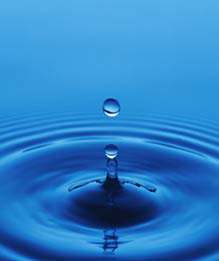 |
 |
 |
 Health & Beauty | March 2007 Health & Beauty | March 2007  
A Glass a Day Keeps Your Stress Away
 Stress Management Society Stress Management Society


| | Water can have a tremendously therapeutic effect on the body – from the sight or sound of waves crashing on a beach to providing a weightless environment for exercise. |
If you stay hydrated, you help keep stress away. But there’s so much more to know about water, according to hydration specialist Dr F Batmanghelidj, in his classic book Your Body's Many Cries For Water. Read on for a quick summary, from how much you really need to how to drink it...

What dehydration does – from asthma to arthritis

Your body needs water to function properly. Chronic dehydration can cause some very serious conditions. Those can include asthma, allergies, arthritis, angina, migraine headaches, hypertension or raised cholesterol. Water effectively oils every joint, plumps up every cell and contributes to every function. And remember that you will die quicker without water than without food!

How much is enough?

So you know you need to drink enough water. So how much is enough? If your urine is clear to very pale yellow, you are well hydrated. But for a more scientific formula, work out your body weight in pounds and divide by 2. The figure you are left with is the amount of ounces of filtered water that you need each. To convert that to litres, divide the figure by 33. (Alternatively multiply your weight in kilograms by 0.033 to see how may litres you need per day.) So someone who is 10 stone (140 pounds / 202 kilos) needs 70 ounces or 2.3 litres every day.

Not all water is the same

Drink filtered water. Unfiltered water usually has chlorine and fluoride added which plays havoc with your system. However bottled water has its dangers too. Plastic bottles can leach chemicals into the water. Therefore glass bottles are best. However the best source of filtered water is if you can create it fresh yourself via a jug or home filter system.

What if you’re training

When you sweat, water goes from your blood to your skin to cool your body. Your blood volume therefore decreases, so the volume of blood in your body decreases. Thus with each heartbeat, less oxygen-rich blood reaches your working muscles. Your rate of aerobic energy production decreases and you must run at a slower pace. Recent studies show that dehydration of 2% of bodyweight leads to about 6% reduction in physical performance. So minimise fluid losses while you exercise, and replace lost fluids as soon as possible afterwards.

Water outside the body

Water can have a tremendously therapeutic effect on the body – from the sight or sound of waves crashing on a beach to providing a weightless environment for exercise. We also recommend floatation in mineralised water and a darkened environment. Proven to reduce adrenaline and cortisol levels whilst boosting endorphins, floating makes you feel calmer and promotes a feeling of wellbeing.

Or try a shower filter to purify your shower water. It screws directly onto your shower unit (no plumbing necessary) then filters shower water for chemicals like chlorine, hydrogen sulphide and iron oxides. A silver layer filters out fungi or bacteria too. Unique technology that protects your hair and body from irritatants.

The Stress Management Society
+44 (0)8701 999 235
info@stress.org.uk
http://www.stress.org.uk or http://www.feelkarma.com | 
 | |
 |



